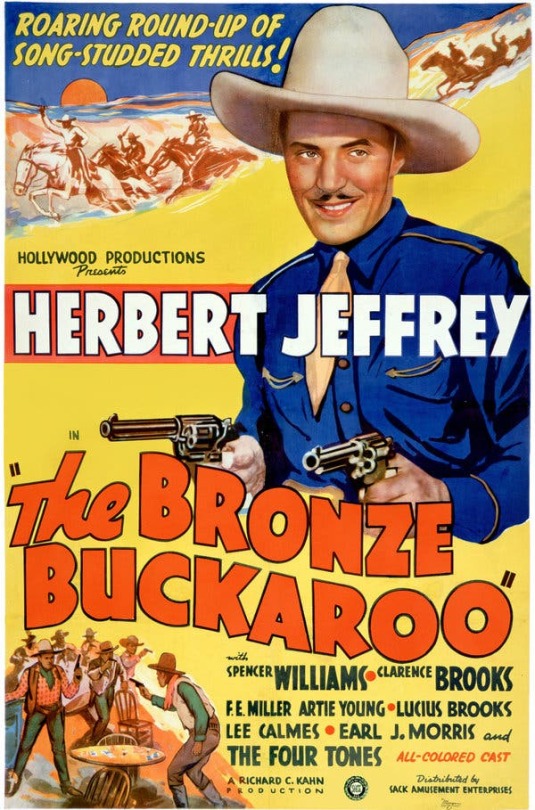#the bronze buckaroo
Text
The Baldur’s Gate 3 companions as classic films.
Part 3.
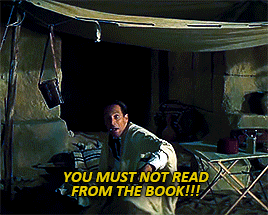
Gale (The Mummy, 1999)

Lae’zel (Bette Davis in All About Eve)
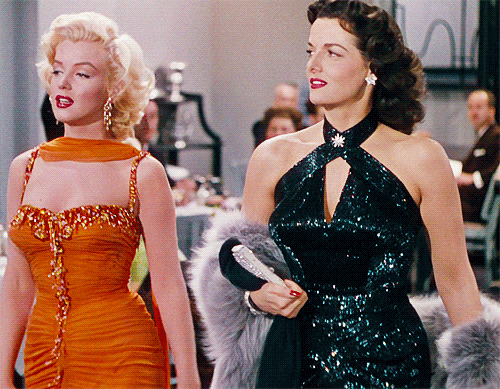
Shadowlach slay (Marilyn Monroe and Jane Russell in Gentlemen Prefer Blondes)

Wyll Ravengard (the inimitable Herbert Jeffries in The Bronze Buckaroo)
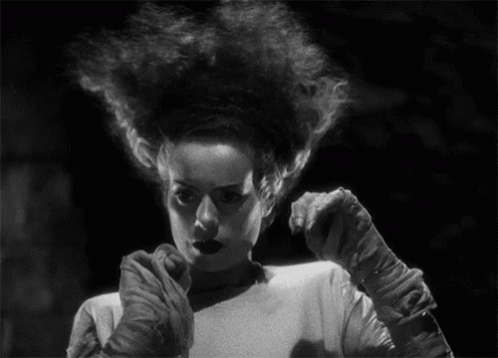
Durge (gorgeous darkling Glynnis Johns in The Bride of Frankenstein)
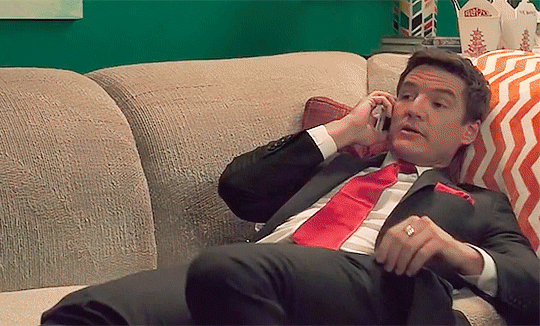
Astarion (Pedro Pascal in Bloodsucking Bastards)
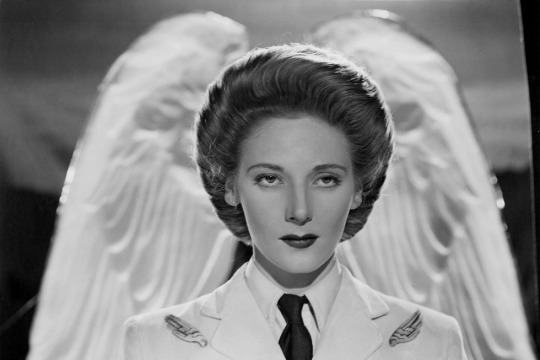
Dame Aylin (A Matter of Life and Death)
#bg3#baldur's gate 3#baldurs gate 3#astarion#gale of waterdeep#karlach#karlach cliffgate#shadowheart#laezel#wyll ravengard#bg3 companions#classic film
29 notes
·
View notes
Text
DOc Savage Man of Bronze Is campy wonderfulness
SO todays my dads birthday ,so we decided to watch a movie together to celebrate .SO my dad grew up reading the pulp novels about Doc Savage,so we decided to watch the 1975 movie by George Pal .Now critics hate this movie.....Critics are wrong ,we loved this movie.It rememnded me of the cult classic Buckaroo Banzai (Who is a Doc Savage pastiche ).The film follows the super intelligent and super strong Doc Savage and his war buddies who are all experts in various fields,the Fasbulous 5 as they investigate the circumstances of Savages fathers death that involves a hidden tribe,and the villainous Captain Seas who seeks to destroy Savage .Guys if this movie came out in either the 60's or the 80's it would have a cult following but I think its a hidden gem .This film is wonderfullly campy ,with fun action,wonderfully over the top goofy moments (Like one of the secondary villains sleeps in a giant crib,I have no idea why).DOc Savage is very well played by Jo9hn Ely embodying the tough adventure hero playing it very deadpan ,and Paul Wexler steals the show as the classic goateed over the top villain Captain Seas .I love The Fabulous Five (Also one of them Long Tom is played by Paul Glesson from Die Hard and the Brekfast Club ) and the whole film appeals to my love of adventure stories and camp
PLEASE CHECK THIS OUT
@angelixgutz @filmcityworld1 @the-blue-fairie @amalthea9 @princesssarisa @ariel-seagull-wings @marquisedemasque @themousefromfantasyland @autistic-prince-cinderella @theancientvaleofsoulmaking @scarletblumburtonofeastlondon
7 notes
·
View notes
Text
WIP Wednesday
Did someone say PJO/9-1-1 AU? I think someone said that...
--------
Eddie’s shoulders tense when he catches Buck’s eye, but he doesn’t say anything. In fact, he doesn’t acknowledge Buck at all, even when Buck steps into the room to change for their shift. “I’m telling you, man, you’re super photogenic,” Eddie remarks loudly. “I bet if you showed Hen, she’d agree with me.”
Chimney hums tunelessly. “You think?” he asks, tapping at the laptop in his hands with his fingers.
“Definitely. I think she’s here already – Cap brought in donuts from some shop near his house, so she’s upstairs taking first crack at them.”
Chimney grins delightedly at the mention of donuts. “Oh, I love it when he brings donuts.” He looks at Buck and winks. “We used to get them from the Monster Donut a few blocks away, but both Cap and Buck aren’t huge fans of the place.”
Buck shifts uncomfortably at the reminder of how close the monster-run chain is to their location. “Cap says they over fry their dough,” he says quickly, “and I had a bad experience with their customer service when I was in New York.”
“Bad experience” really means almost got eaten by a hydra and “when I was in New York” translates to when I was fighting a war that decided the fate of the world while every mortal in the tristate area was asleep, but Buck doesn’t mention those parts of the story.
Eddie nods slowly. “And an experience in New York would absolutely translate to an LA branch.” Buck does not appreciate the dry sarcasm.
“Yeah, well you don’t know Monster Donut,” Buck mutters, pulling his work boots from his duffel bag. He’d thought about changing at home this morning, but his boots are loud. He hadn’t wanted to disturb Maddie.
Unfortunately, that gives Eddie the chance to look into his duffel. “Is that a sword?” he asks incredulously.
Buck blinks. Well, shit. “No,” he says, his voice dripping with sarcasm. “It’s a pen.” It’s a knife, actually. More specifically, it’s the knife he keeps in his boot just in case he comes across something on a call that he really doesn’t want to deal with – which has happened a couple of times.
He shudders at the memory of the angry ocean spirits that had nearly killed Bobby at the plane crash. He remembers their long, clawed hands wrapped tightly around Bobby’s legs as they pulled him down, down, down into the depths as retribution for pollution that hadn’t been his fault.
He remembers the flash of bronze in the murky haze and the feeling of cool hands tugging harshly at his legs.
Chimney pushes past both of them to peer into Buck’s bag. “Dude, it’s just a Swiss Army knife,” he says between smacks of gum in his mouth. “Some firefighters carry them in case of emergency. It’s just a personal thing.” He pats Buck on the back. “Besides, swords are for LARPers. Not really Buckaroo’s scene.”
He chuckles to himself and walks out the room with a wave, leaving Buck and Eddie to themselves.
“But,” Eddie mutters, “that’s not a Swiss Army knife.”
Buck slams his locker closed, taking great pains to ensure that Eddie can’t see his combination and go snooping further. “Maybe you should get your eyes checked,” Buck replies darkly. “Those iPhone filters don’t seem to be doing you much good.”
He stalks out of the room and lets the door slam behind him.
At least he was right about Chimney; he doesn’t have the sight.
It’s a small comfort.
#fernowrites#wip excerpt#wip wednesday#911 fox#pjo crossover#sorta#evan buck buckley#chimney han#Eddie Diaz#monster donut
13 notes
·
View notes
Text
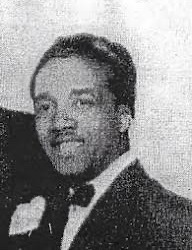
Leon Henry Buck (April 15, 1916 - April 27, 1976) was the firstborn child of Ulysses Simpson Grant Buck and Janie Buck in Clarksville, Tennessee. He had seven brothers and sisters.
He enrolled in Lane College where he studied music. He met three young men: Lucius Brooks (Dusty), Ira Harding, and Rudolph Hunter who along with him formed the singing group, The Four Tones Singing Quartette. Lane College did not approve of the music they sang so they left college to pursue a musical career.
He and the Four Tones migrated to Dallas and soon afterward were featured in the Hall of Negro Life during the Texas Centennial Exposition. The group began traveling and performing in night clubs and they changed their names to Dusty and The Four Tones.
He recorded with Dusty and the Four Tones for the Seclusion, Uptown Rhythm, and Kangaroo Record Company. They released their first single, “I’ll Follow You.” They recorded with Checker Recording Co., where they released “Genevieve.” The Four Tones signed with Sun Records, where they released “Heaven or Fire.” The songs, “The World Wasn’t Made That Way” and “Chili Dogs” were recorded with Bullet Recording & Transcription Co. The Four Tones released “Ol’ Man River” on the Majestic Records label.
He appeared in many Hollywood motion picture productions with Dusty and the Four Tones, but he stared in the first “all-colored” western: Harlem on the Prairie. Other films followed including Two-Gun Man From Harlem, Rhythm Rodeo, The Bronze Buckaroo, and Harlem Rides the Range. His last film, Mantan Messes Up was released in 1946.
They recorded “My Heart is Aching for You” written by him. The group, supported by film star Dorothy Dandridge, regularly played in several Hollywood venues. He was drafted into the Army (1942-45) and was honorably discharged.
He obtained his credentials from California State University at Northridge. He began teaching at Vaughn Street Elementary School and remained there until his retirement.
He was posthumously given the Communication and Information Resource Center Administration Award at the Institute of Arts in Detroit. #africanhistory365 #africanexcellence
0 notes
Text
youtube
The Bronze Buckaroo (1939) / Western film / Herb Jeffries, Artie Young, Rollie Hardin
0 notes
Text
right i need to rant this here because nowhere else is safe but i need to put this down i need evidence if i ever doubt myself
when django unchained came out and we watched it at school i absolutely despised the film, i couldn’t put my finger on it but there was something fundamentally wrong with it and as a green 17yo from czech republic i obviously didn’t have the knowledge to point it out but it stayed with me up to my MA degree where during a seminar on African American poetry, we stumbled upon django unchained and I finally could put it into word what i think is wrong with it, which was a white director taking a story of a Black man and appropriating, which was basically dismissed by “I don’t think tarantino really cares what other people think” by one of the guys in the seminar
butbutbut just because a white guy in his mansion doesn’t care doesn’t mean it’s right and the mere existence of the movie continued to bother me but i kinda forgot about it
and then during my phd which i didn’t even realise was so closely connected to django fucking unchained i came across a chapter in one of the theoretical books which talked about django fucking unchained and what an absolute atrocity it is on all levels AND the author also highlighted the immense arrogance of tarantino claiming he invented Black western which he wouldn’t do if he did even a teeny bit of research anygays, someone finally put into words what bothered me so fucking much about django unchained all those (lol 10) years ago, thanks Michael K. Johnson and his conclusion in Hoo-Doo Cowboys and Bronze Buckaroos: Conceptions of the African American West (2014)
and also the fact that something i knew was wrong when i was a teenager somehow ended up the thing i’m trying to write against in my phd without me even realising it does make me think that some things are meant to be so no, i should not doubt my research stop
0 notes
Photo
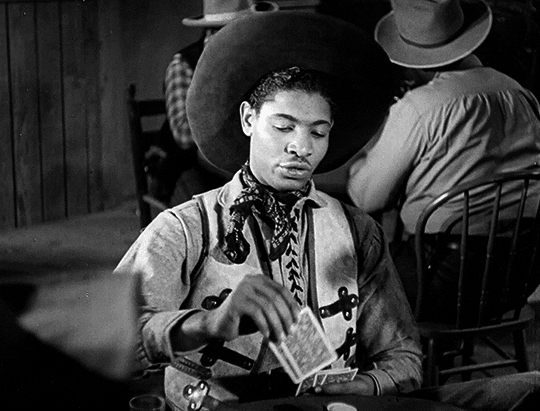

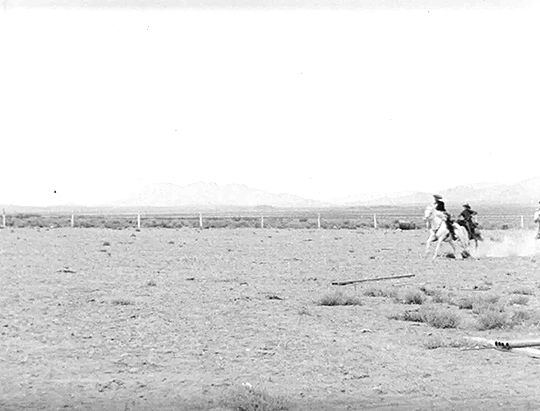
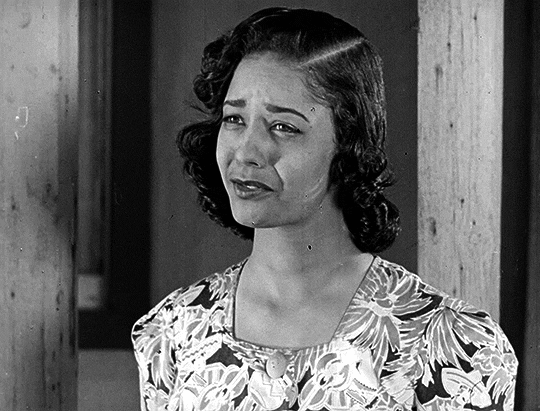
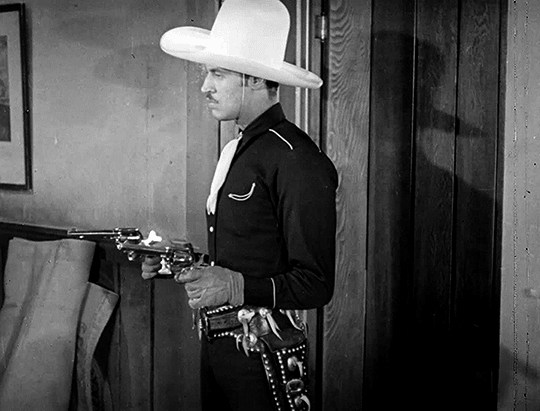

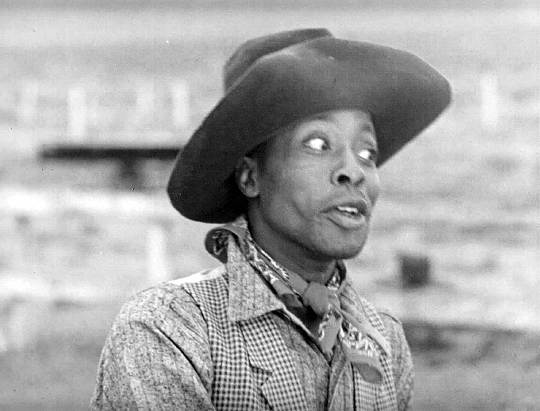
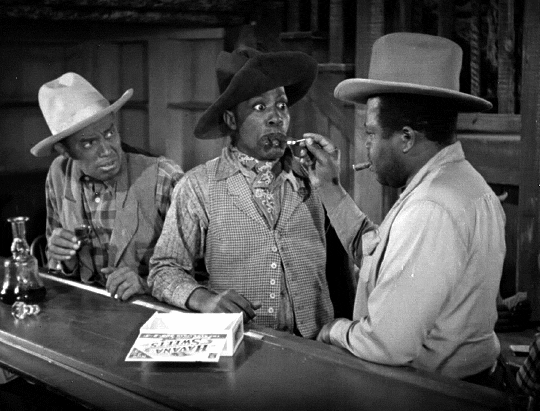

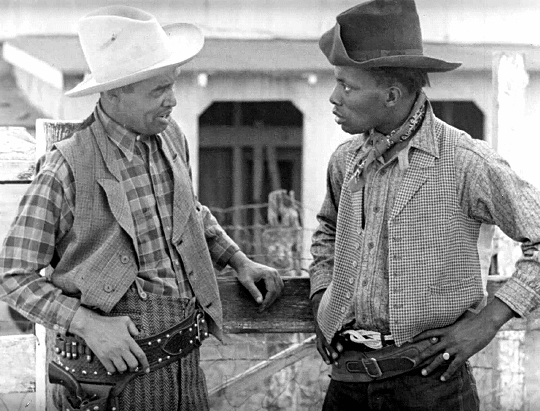
THE BRONZE BUCKAROO (1939)
dir. Richard C. Kahn
#oldhollywoodedit#classicfilmedit#filmedit#classicfilmblr#classicfilmsource#cinemaspam#filmgifs#moviegifs#cinemapix#userstream#chewieblog#mygifs*#bronzebuckaroo*#the bronze buckaroo#herb jeffries#artie young#richard c. kahn#1939#1930s
4K notes
·
View notes
Photo
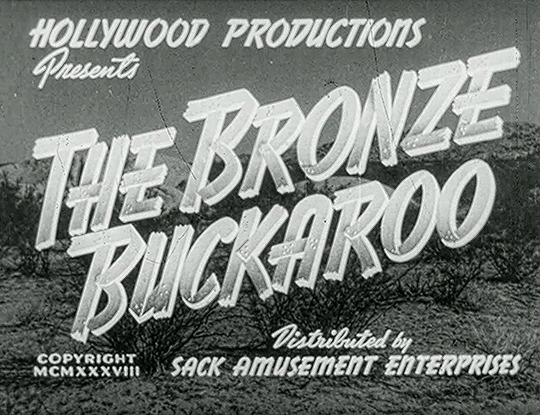
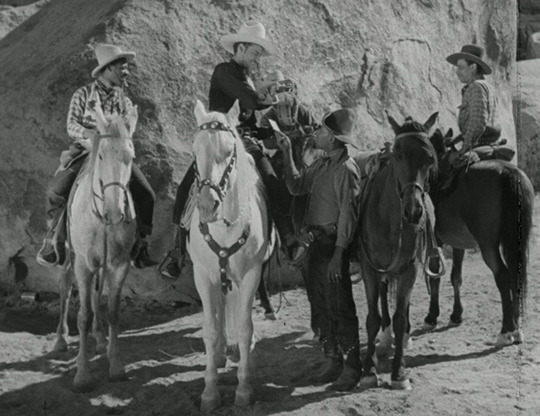
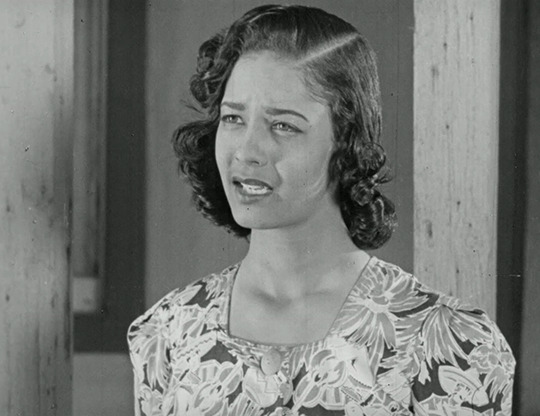
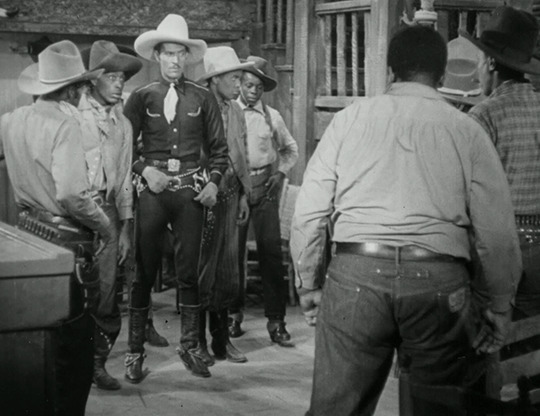
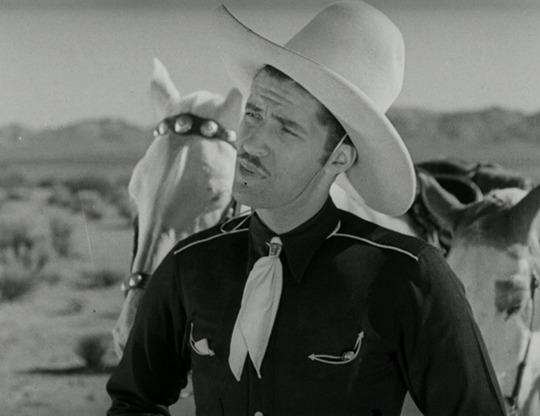
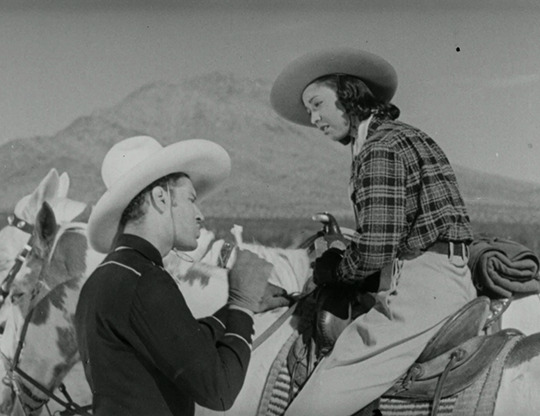

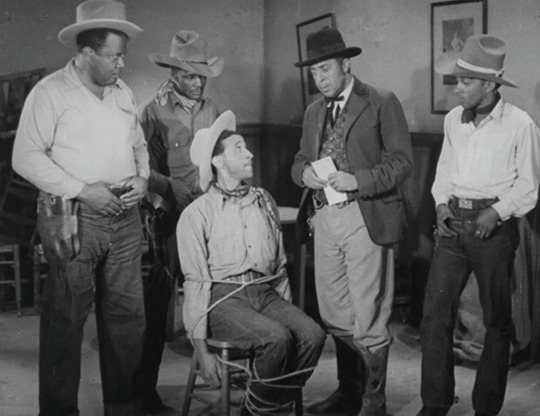
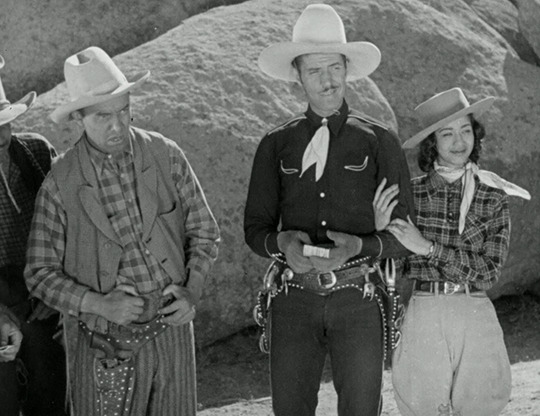
The Bronze Buckaroo (1939) dir. Richard C. Kahn
#american cinema#film: the bronze buckaroo#genre: action#genre: adventure#genre: mystery#genre: romance#genre: western#1930s
85 notes
·
View notes
Photo
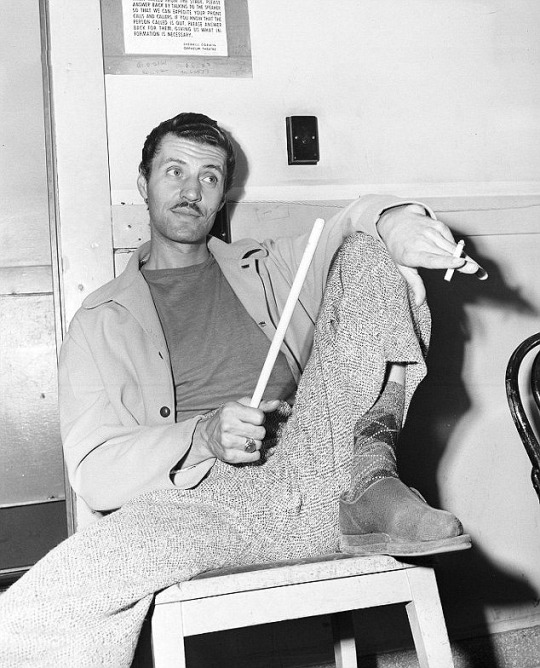
“Herb Jeffries (1913-2014), a jazz balladeer whose matinee-idol looks won him fame in the late 1930s as the 'Bronze Buckaroo' — was the first singing star of all-black cowboy movies for segregated audiences. The jazz baritone had a seven-decade career, including singing with Duke Ellington’s Band. “
#herb jeffries#black cowboys#black actor#actor#duke ellington's band#jazz#vintage#bronze buckaroo#1940s#40s#40s fashion
62 notes
·
View notes
Note
Heya, my partner and I have gotten into pulpy movies and we were wondering what we should start looking into next. We enjoyed Barbarella, Flash Gordon and Battle Beyond the Stars.
You're an expert on all that is pulp, I was wondering if you have any choice few that we should watch next? (more obscure the better)
Well, "pulpy" by definition would be anything whose material is derived from pulp magazines/comics, serial radio dramas/thrillers, and the older kind of cheap, black and white b-movies from the 1920's-1950's that were cranked out by smaller studios, and often referred to as "Poverty Row" films.
I feel like I should separate these a bit into categories, as some have a different flavor than others, but are still part of the broader definition. I'll start with the outliers.
Giallo:
For the sake of technicality, I can't really go over pulp without mentioning giallo. Giallo films are kind of the pulp films of Italy, and are even named for the distinctive yellow covers of the novels from which they're derived. I've actually gone into detail about giallo before, with many notable examples.
Krimi:
Think of krimi as the German cousin of giallo, except with less sexuality. Sadly, this is an area I have not yet delved into myself, but I have found an excellent list to start with:
Notable Pulp Films:
This is going to be more along the lines of what you're looking for (though I'm including the three you mentioned as well).
The Rocketeer (1991)
Sky Bandits (1986)
Red Tails (2012)
Doc Savage: The Man of Bronze (1975)
The Green Hornet (1940)
The Shadow (1994)
The Phantom (1996)
The Spirit (2008)
Dick Tracy (1990) (Tubi TV has a lot of the old films, if you're interested in those)
Sky Captain and the World of Tomorrow (2004)
Sin City (2005)
Big Trouble in Little China (1986)
Flash Gordon (1980) (Tubi also has a lot of the old serials)
Barberella (1968)
Battle Beyond the Stars (1980)
Buck Rogers in the 25th Century (1979)
Biggles: Adventures in Time (1986)
Remo Williams: The Adventure Begins (1985)
Starship Troopers (1997)
The League of Extraordinary Gentlemen (2003)
Raiders of the Lost Ark (1981)
Indiana Jones and the Temple of Doom (1984)
Indiana Jones and the Last Crusade (1989)
Allen Quatermain and the Lost City of Gold (1986)
Other:
I decided to add a couple of films that weren't literary-based, but that I felt would make a good fit with this list:
The Adventures of Buckaroo Banzai Across the 8th Dimension (1984)
Darkman (1990)
Six-String Samurai (1998)
It took me a while to differentiate exactly what a pulp film is due to the definition being skewed by people like Quentin Tarantino, but I hope this list gives you some good entertainment.
(As always, Tubi TV is free to sign up, but permanent link availability is not guaranteed)
17 notes
·
View notes
Text
maybe one day i’ll fly next to you
chapter 1/8
read on ao3
The sun is just rising when he gets to the rink, the early morning light streaming in through the high windows, making the ice glow. He’s the first one there, just like he planned, so he gets to take his time getting ready. He stretches a bit in the locker room before lacing up his skates and heading to the ice. Placing his guards on the boards, he takes a minute to just look, relishing in the stillness, the quiet, the smooth surface of the untouched ice. He takes one step, two, and he’s off, gliding through the mirrored surface, carving his path as he goes.
Buck can’t remember a time when skating wasn’t his entire life. He first put on skates at four, wobbling on the side of the rink while Maddie was in lessons. He started lessons of his own at six, and after that, he never stopped thinking about being on the ice. And he was good, too — by eight he was competing in the regional circuit, already landing a handful of clean triples when most kids were still struggling with doubles. He qualified for his first nationals at 10, won gold in Juniors at 11, and by the time he qualified for Junior Grand Prix at 13, people already knew his name. They knew his “modern artistry” as they called it, his powerful jumps, and talked about him like he was someone worth watching out for once he made it to the senior level.
It helped that by then, Buck was already addicted to competition. He loved skating on its own — the power he felt when he jumped and flew across the ice, the beauty of well-executed spirals and step sequences — but nothing made him feel more alive than doing it in front of a crowd and a panel of judges. Landing each element perfectly sent a thrill through him that he never wanted to stop feeling, and seeing his scores, usually much higher than others, was something that never got boring. He wanted to be the best, was on his way to being the best, and those hazy dreams of an Olympic gold medal didn’t feel quite as hazy anymore.
For a while, at least. Until he showed up.
But Buck doesn’t want to think about him right now, he just wants to enjoy the peace and quiet while he can. He’s not skating to anything in particular, just the music in his head taking him wherever feels right. He’s so lost in it, trying to nail the bit of choreo he just made up, that he doesn’t even notice Bobby until he hears him clapping from the benches.
“Looks good, Buck. Talk to Hen, I think that would work in your new short.”
“Thanks Bobby,” Buck says, making his way to the boards. Bobby hands him his guards and his water bottle, heading back towards the locker room.
“Come on, we’re just about to get started.”
Bobby and Athena have had this beginning of the season meeting for as long as Buck has been at their club. They go over assignments for Grand Prix and the Challenger series, figure out general training schedules, and do a “goal setting session” for what they want to accomplish this season.
Bobby calls it a “family meeting”, which is cute but also annoying. Skating isn’t a team sport. Families don’t win medals. And that’s all Buck wants to accomplish every season until he retires: he wants to win.
He sits down on a bench next to Maddie, who’s deep in conversation with Athena about her and Chimney’s programs, he’s sure. She’s been planning them since Worlds, so they’re probably fully choreographed and ready for competition. The Buckleys are nothing if not overachievers.
Bobby clears his throat, standing in front of the roll-away white board, and gets started. Buck’s half paying attention — it’s the fifth time he’s heard the “athletes aren’t born, they’re made” speech, he gets the point — letting his eyes wander over the small crowd of skaters. Chim’s on Athena’s other side, nodding along with Bobby. May and Hen are standing along the lockers, whispering quietly. The Juniors kids are sitting on the floor, in awe of their coach as he talks about hard work and victory. Buck gets it, he’s still a little in awe of Bobby himself, but not so much of his recycled speeches.
There’s one face, though, that he doesn’t see, and for a minute, he’s hopeful. He’s gone, he moved, he went to work with Rafael in Lakewood or something, so I’ll only have to see him maybe four times a year instead of every goddamn day thank god—
The doors to the locker room burst open, and fuck.
Because, nope, he’s still here. Windswept and out of breath and 15 minutes late, yet somehow still oozing confidence and jackassery.
Eddie Diaz. Olympic Bronze Medalist. Two time reigning World Champion. And the absolute bane of Buck’s existence.
Bobby doesn’t even say anything, just waves him in and keeps talking. If Buck had been that late, even if it was for a good reason, he would have had his ass handed to him in front of everyone and would’ve had to run laps or something after his ice time. But of course, Eddie gets a pass.
Whatever.
Buck doesn’t pay much attention to the rest of the meeting, too busy trying to keep himself from glaring at Eddie every 20 seconds. He tunes in enough to hear that they’ll both be going to Skate America and NHK because of course they are and spends the rest of the meeting trying to keep his blood pressure down. When it’s finally over, he makes his way through the crowd to get back to the ice for his first session with Bobby. He’s scrolling through his phone, trying to find his music, when he feels someone walk over and join him on the bench. He looks over, and lo and behold—
“Eddie,” he says with what he hopes is a low level of contempt.
“Buck,” Eddie responds, looking over and nodding as he laces up his skates. “Good summer?”
“Fine.”
“Ready for the season?”
“Always am.”
Eddie smiles, easy and charming, and Buck hates his fucking guts. He nods at him again as he heads onto the ice, and Buck gives into the temptation to thump his head against boards a few times.
It’s going to be a very long year.
~~~~~~~~~~
Buck has hated Eddie since they were 16 years old.
Okay, maybe “hate” is a little strong, but whatever emotion it is when just looking at a person makes you feel like smoke is coming out of your ears, that’s how he feels.
It was his first season in Seniors, and he had been doing better than he expected in the first half — a silver and a bronze at his Grand Prixs, and fifth at the Grand Prix Final. Nowhere near perfect or the best in the world, but he was the best US men’s skater and poised to win gold at Nationals. He hadn’t even heard the name “Eddie Diaz” until he got to Nats, and even then it was just whispers — some small town kid from Texas who was landing clean quadruple jumps at a time when some of the highest ranked skaters couldn’t. Buck was working on them — his coach kept harping on how important they’d be to the sport one day — but he’d hit a growth spurt just before the beginning of the season, so he was still getting used to his new center of gravity.
But the rumors were true, Buck saw it with his own eyes at a practice session. He remembers the mix of awe and dread as he watched Eddie jump — the thoughts of damn I want to be as good as this kid and he’s about to take everything from me.
Eddie won Nats by about 30 points. Buck came in second. The US only had one spot at both Four Continents and Worlds, and Eddie got picked for both. Something about having “a better chance with his abilities and consistency in the international field” or some other bullshit.
He didn’t podium at either. Buck felt shamelessly vindicated.
Over the next three years, they became perfect foils of each other — Buck with good jumps but better artistic expression and connection to the music, Eddie a little stiff but a blur of height and speed in the air. They flip-flopped at competitions — Buck got silver, Eddie got gold. Buck got gold, Eddie got bronze. Nats turned into a yearly showdown, the media always highlighting their “friendly rivalry”. Buck must have been a better actor than he thought if he was coming across as “friendly”.
He won Nats right before the Olympics, pretty much guaranteeing his chances of getting named to the Olympic Team. Two days before the announcement, he broke his leg on a bad landing and felt his dreams shatter along with the bone.
Eddie went instead. He placed third, higher than any US man had placed in 12 years.
Buck watched it all from his couch, unsure if he’d ever be able to skate again.
Fast forward three seasons, and while Buck is still struggling to get his consistent jumps back, Eddie keeps skyrocketing. He hasn’t lost a major competition in two years and is the overwhelming favorite to win the gold medal in Beijing. It was bad enough to hear about it from other skaters or see at competitions, but then Eddie moved to Bobby and Athena’s club a year ago, so now Buck gets to suffer through first hand observation.
It simultaneously pushes him harder and makes him want to die.
Which is the exact feeling he has right now as he watches Eddie land a perfect quad toe triple toe combo. He tried the same combo yesterday and landed flat on his ass, so now he just wants to practice it over and over until it’s perfect and he can rub it in Eddie’s smug face. See, you’re not the only one who can do it. You’re not that special.
“You better watch how hard you’re frowning, Buckaroo, you’re gonna get wrinkles,” Hen says as she walks over to him. She follows his line of sight, and her expression turns from vaguely worried to exasperated. “Staring that hard at Eddie isn’t gonna make him fall.”
“It could,” he says. “Maybe I have untapped psychic powers that are just waiting to come out.”
She gives him a flat look. “Sure, and I’m the long lost crown princess of a small European country. Can we go over your free instead of fantasizing about stupid things, please?”
“Fine, fine,” Buck says, finally turning away from Eddie as he steps on the ice.
He loves his programs this season — he usually doesn’t get used to them for a few months, but this time around, he already feels connected. His short is more modern, melancholic and gritty, while his free is more classic, hopeful, makes him feel like he’s floating rather than skating. He’s always been good at choreography — either taking it and making it his own or creating steps himself — and he feels like both really highlight his talents. Plus Hen, being the amazing choreographer and friend that she is, let him have a lot more input this time around, so it all feels more authentic. He likes to think that no matter what happens, he’ll be proud of whatever he puts out with these pieces.
They work on his free for an hour, and he stays an extra two to work on his short and his jumps on his own. By the time he leaves, the sun has set, his legs are already sore, and he has a lovely bruise blossoming on his right thigh from falling on his quad flip three times in a row.
It’s all worth it, though. Because as much as he wants to be happy with his programs no matter what, he knows he won’t be unless they get him to the top of that podium, hearing the national anthem play with a gold medal around his neck.
~~~~~~~~~~
He’s floating away in his dream, higher and higher like a runaway helium balloon. He can see the whole world below him, spread out and endless, rolling hills and forests and oceans. He wonders if he’ll ever come back down, or if he’ll just keep moving up and up, into the atmosphere, into space, into a different universe. He thinks that might not be so bad.
Suddenly, he’s falling, plummeting back down to Earth like an asteroid. He’s racing and racing towards the ground, bracing for impact, for everything in his body to break, he’s falling and falling faster and faster—
He wakes with a yell, covered in sweat, his leg twinging. He takes a few minutes to breathe and get his heart rate back down, but even then, he’s still shaking.
He looks at the clock. 4:30am. He could go back to sleep — he doesn’t have practice until noon.
Except his mind is churning now with the phantom memory of breaking. The feeling of going from standing to not being able to move, pain radiating from his leg into every other part of his body. The panic, not just for his body, but for his whole life and what it could turn into. What he could lose.
He lays there for another half an hour, but the memories just keep burning. So, he does what he always does when he needs to shut his mind off.
He goes to the rink.
First practice isn’t until 8am, so he uses his keys to unlock the back door. Chuck, the janitor, was sick of waiting two extra hours to lock up after him, so he gave him his own set after his first season. Buck gives him a giant cookie bouquet for Christmas every year in return.
He feels better after just a few laps around the ice. The chill that bites as he speeds up his pace, the white noise of his blades in the ice, it all settles him like nothing else. He speeds up still, setting up for a triple Salchow — easy, almost second nature, a jump he could do in his sleep. He pushes off, but as soon as he’s airborne, something jolts through him, makes his stomach turn over. He pops the jump to a single and lands on the wrong edge, losing his balance and sprawling across the ice on his back. He stays there, staring up at the lights, letting the cold leech in through his sweatshirt.
Almost four years later, and this is still happening. He scares himself out of jumps like he expects each one to end badly, even though he knows — logically, statistically knows — that it’s unlikely.
And yet. Here he is. On his back. After another failure.
He’s too tired to feel pissed or frustrated like he usually does, so he’s just resigned. Today is not the day for jumps. That’s just how it is.
He gets up finally and skates over to his bag, digs his headphones out and queues up his short program music. He works through the step sequences, over and over, making little tweaks as necessary, thinking through where the judges could take off points until it’s perfect. The repetition quiets the last of his racing thoughts, and he finally feels like himself again.
He’s moving into his last spin when he sees movement out of the corner of his eye. He slows down enough to recognize Eddie, inching towards the locker room like he’s trying not to be seen.
Buck stops, staring Eddie down. “What the hell are you doing here?”
Eddie freezes eyes wide, looking suspiciously guilty. He walks forward, hand rubbing the back of his neck. “I have an 8am and wanted to beat traffic on my way in. The back door was open when I got here, and I saw the lights on, so I—” he swallows, looking anywhere but Buck’s face. There’s a blush crawling up his neck, and he looks nervous.
Nervous like he just got caught somewhere he shouldn’t be, Buck thinks. He narrows his eyes as he checks his watch — it’s 7:00. He gets wanting to beat traffic, but a whole hour?
He quickly makes his way off the ice, grabbing his bag from the bench. “Well, I’m done for now, it’s all yours.”
“Thanks,” Eddie says quietly. Buck’s just about through the door when he hears his name. He turns back to Eddie, his blush now all the way up to his hairline.
“You looked good out there. Can’t wait to see it in competition.”
Buck freezes, processing the compliment. A compliment. From Eddie. They hardly talk unless they have to, and even then it’s never friendly. Cordial, sure, but not friendly.
So why is he being so nice now?
Buck just narrows his eyes again before stalking off to the lockers.
~~~~~~~~~~
“Mads, I really think he’s gonna pull a Tonya Harding on me.”
She looks at him over her wine glass, unimpressed. “Yeah, because that worked out so well for Tonya the first time.”
“I’m serious!” he says, taking a sip from his own glass. Neither of them drink during the season, so they’re taking full advantage of their weekly wine nights while they can. Buck’s not a lightweight by any means, but two glasses in and he is starting to feel a little fuzzy. And a little crazy, trying to figure out what Eddie was up to this morning. “You haven’t seen any weird guys lurking around have you? You’d tell me if you did, right?”
Maddie rolls her eyes. “You sound insane.”
“I’m not insane if I’m right. Why else would he be watching me?”
“We all watch each other, Buck! He was watching Chim and me yesterday too while he was on break. He even said our twizzles were really in sync.”
“You better watch your back too, maybe he’s trying to take the whole club out.”
“Oh my god,” she says, pouring another, very full glass.
“He’s just so— he’s—”
“Annoyingly perfect? Obnoxiously talented? I know, Buck, you only bring it up every 15 minutes.”
Buck deflates at that. “I don’t— it’s not that often.” Sure, he rants about how clean Eddie’s edges are and how good his quad flip is, but that’s because it’s so irritating. Buck works just as hard as Eddie, and he knows he’s not flawless. But somehow, Eddie is. Stupidly flawless and perfect and—
“I’m just saying,” she says, squeezing his hand across the table and bringing him back to the conversation. She pours him another generous glass, too. “This energy is great, but it would probably be better to put more of it into practice and less of it into worrying about one of your competitors. I know you’re nervous about this season, but you can’t let that turn into this weird paranoia. Don’t let it take your head out of the game.”
He sits back and sighs. She’s right, of course. She always is.
He doesn’t tell her that, though. Just takes a gulp of wine and tries not to think about Eddie’s annoyingly perfect anything.
~~~~~~~~~~
There’s a news truck parked outside the rink when he gets in the next morning, and he spends about 15 minutes contemplating just going home and telling Bobby he’s sick.
The lead reporter — Taylor, he thinks — claims they’re here to do a profile on the club and how they’re preparing for the Olympics, but he knows they’re mostly here for Eddie. They want any and all sound bites they can get from him to use over and over and over in coverage leading up to Beijing. Quotes about hard work and following his dreams that they can play over footage of him skating and smiling after winning again. Buck’s already annoyed at the prospect of seeing them on NBC Sports for the next six months.
To their credit, they do film everyone practicing at some point. They get Maddie and Chim doing their new rotational lift, May landing her triple lutz that she’s been working on for months, and Buck’s nearly perfect (if he does say so himself) flying camel spin. So at least they have good footage of him, not just random shots in the background of Eddie’s. Maybe he’ll even get his own little promo.
Bobby calls him into his office after lunch, where the news crew has set up an interview space. He wasn’t expecting to talk to anyone — maybe a quick question at the boards, but nothing this fancy. He sits in one of the chairs as someone puts powder on his face and tries to do something with his hair. Taylor sits down across from him, a 1000-watt smile turned on as the cameras start rolling.
“So, Evan. Or do you prefer Buck?”
“Evan’s fine.” As much as he hates his first name, it’s how the general public knows him. Buck is reserved for friends and family.
And Eddie, an annoying voice reminds him. Fine, friends and family and...competitors.
“You came in second at Nationals and Four Continents last year, and fourth at Worlds. How do you feel about the momentum going into this Olympic season?”
“Every season is different,” he says as diplomatically as possible. These reporters always want drama, someone slipping up and bragging about themselves when they have no right to. He’s not wrong — every season is different. No matter who’s expected to win or who has the most medals, you never know how everything will play out. “We haven’t had a men’s field this strong in a while, so it’ll be interesting to see what happens. But I’m as prepared as I can be at this point.”
“You were injured right before the last Olympics. Do you see this year as a bit of redemption for yourself?”
He feels his smile go tight. “It’s every kid’s dream to go to the Games. It’s certainly still mine. I’m ready to do whatever I can to make that dream come true.”
“Eddie Diaz has been with your club for just over a year now. What’s it like training with him?”
There it is, he thinks. He’s surprised she asked so many questions about him before getting to Eddie. The first responses he thinks of are all variations of he sucks and I can’t stand the sight of him, but he knows any petty answers will be worse for him personally than anyone else. So, as much as it pains him, he settles on the nicest version of the truth he can muster.
“Eddie’s an amazing skater,” he says, surprising himself at how genuine he sounds. “He’s been paving new paths in the sport, and he’s pushed everyone to be better to try and get on his level, myself included. He definitely brings that same energy to the club.”
“Do you think you can beat him this year?”
Wow, she’s not holding any punches.
He shrugs, smiling through the sudden burst of anxiety in his veins. “We’ll just have to wait and see.”
~~~~~~~~~~
Despite his less than fiery interview, Taylor asks him what he’s doing after practice right before they leave. It’s easy enough to turn her down — he’s got an early PT appointment in the morning, plus the way she’s been looking at him all day is making him itchy. He can tell she only sees him as an object — as a means to get her name on a lead story or a body to keep her bed warm or both — and that’s just not something he’s interested in. Maybe a few years ago, when sex was a way for him to forget about the potential end of his career, but not now.
As nonchalant as he was in the interview, this season really could make or break him.
He can’t afford any distractions.
#buddie#evan buckley#eddie diaz#911 fox#buddie fic#911 fic#9-1-1#SHE'S HERE#I HOPE Y'ALL LOVE MY CHILD AS MUCH AS I DO#and if not that's okay this is pure self indulgence#fs au#ficcery
49 notes
·
View notes
Text
Buck and the Preacher (1972)
Buck and the Preacher (1972)
Buck and the Preacher (1972) Criticized for its use of “racist stereotypes,” unable to decide whether it should be a revisionist history or simply a Blackspoitation comedy, the first movie Sidney Poitier wound up directing joins a tradition established by the Bronze Buckaroo Herb Jeffries who reinstated people of color into the myths of the American West. Joined by Harry Belafonte and Ruby Dee,…
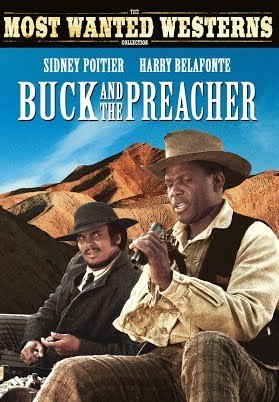
View On WordPress
2 notes
·
View notes
Note
🐢, 🦄, and 💩!
OoOoOoh!
Okay, so two of these will be for Rosie and one will be for my newest sole survivor Eliza! Buckle up, buckaroos.
Soooo to start off, a mental health headcanon for...Rosie!
Rosie has severe anxiety. She’s on a constant emotional rollercoaster precisely because of that anxiety.
I tend to sprinkle my own traits into any and all characters that I write, and this trait is one that Rosie and I share. Rosie flies off the handle easily because she’s literally always on the verge of blowing up, and when you’re constantly anxious, any inconvenience feels like the absolute end of the world, and any small annoyance feels like a personal attack that needs to be met with scorched earth level vengeance.
Remember the Glowing Sea? The poor thing was crying on the ground and couldn’t even figure out why. Which may or may not have been inspired by events from my own life...whoopsie!
Rosie’s like a soda bottle that’s been shook up. All you have to do is pop the cap and it explodes.
Okie dokie! Now for a physical health headcanon for my grumpy girl Eliza!
Eliza was given a medical discharge from the army after she was shot in the head in the battle of Anchorage, and the fact that she was in a medical coma when the American troops finally reclaimed Alaska is something she's gonna have a hard time getting over. Because of the scarring on her brain, she's had several seizures, however! She doesn't know that, which is actually quite common if you're not having grand mal seizures, (whole body spasms, collapsing, biting your own tongue, etcetera,) and thinks she's absolutely fine.
She...definitely isn't.
The woman has post traumatic epilepsy and is simply ✨ignoring it.✨
She suffers from focal seizures, (That means there's abnormal electrical activity in one part of the brain. You know, from the bullet wound,) and she's pretty much just ignoring the fact that sometimes she just gets really dizzy, smells things that aren't there, or just starts staring into space. And you'll see how this effects her if I can finally pull my head out of my ass and start writing those chapters for you guys, lol.
And finally, a ridiculous headcanon for my sweet summer child Rosie.
When she was fifteen, she placed third in a youth gymnastics competition, which to Rosie, is failing miserably. The girl who placed first, (Cecilia Adler, that cantankerous bitch,) was a year younger than she was. Rosie was pissed...
So in trademark Rosie fashion, she pulls up to the judges table and asks what the hell was up with her scores. One of the male judges, (who knew her family from way back,) told her maybe she should go into pageants like her sisters instead of participating in competitions that required, “real skill.”
Cut to Rosie being dragged out of the building by her mortified mother, after she screamed at said judge that Alice, (the sister directly above her in age, if you don’t recall,) won the title of Miss Bluebonnet Days the year before because of her moving and passionate baton routine, which requires a shit ton of skill, thank you very much. She wasn’t ejected, however, until she told him that maybe if he got his “shiny bald head,” out of his ass, he would know talent and skill when he saw it. Needless to say, she went home without even getting her bronze medal.
I would say she never lived it down, but let’s not kid ourselves, there were several incidents just like this.
Rosie is extremely competitive. She’s also the sorest loser this side of the Rio Grande.
Yay! Thank you for the ask, and uh...here’s your novel, I suppose. ;) I got a little bit carried away, but I just love talking about my OC’s....aaand pretty much everyone I write, lol. Bethesda can bite me, I’m writing fully fleshed out, flowing, beautiful characterization for the smallest of background characters just because I can.
Hope you guys enjoy!
#send me asks#asked and answered#i could literally talk about them all day#fallout 4#fallout#Rosie Castavet#Elizabeth Ward
6 notes
·
View notes
Link
It was particularly dangerous during the Jim Crow era. Black motorists frequently found themselves turned away at motels, coffee shops, even gas stations. Pass through an all-white town after dark, and they could be arrested – or lynched.
It was a perilous time, but one New Yorker made it easier.
His name was Victor Green, and for decades he wrote and self-published a guide called The Green Book. It first came out in 1936, and each year’s issue provided an updated, state-by-state list of businesses that faithfully served black customers. “Carry your Green Book with you,” its cover advised. “You may need it!”
Yes, that should sound like a warning to black drivers; it was that dangerous.
That African-Americans drove through the country at all was a tribute to determination. When the Green Book debuted during the Depression, the average price of a car was $760, six month’s wages for most blacks. Many banks wouldn’t give them loans; most insurers wouldn’t write policies.
Some dealerships refused to sell to African-Americans – even if they paid in cash. General Motors management worried that black customers would cheapen the Cadillac brand and scare off white buyers. The company relented when they realized how popular the car was with black celebrities.
Once black motorists managed to get a car, their troubles took new turns. Of the nation’s gas stations, only one chain, Esso, regularly welcomed African-Americans. Finding a hotel or cafe was even harder. Black families setting out for a drive learned to bring containers of gasoline in case they ran out, and they packed food because eating in restaurants was so chancy. Longer excursions? Best to pack some blankets in case you had to park somewhere and sleep in your car.
As much of a hassle as all of this planning was, it was minor compared to the actual trip. Racist cops, infuriated by the sight of black drivers, were ready to pounce. Some African-American men bought chauffeur’s caps so, if they were stopped, they could claim they were just servants running errands.
Yet if it were dangerous to be caught driving while black it was still preferable to the institutional nastiness of segregated public transportation.
“Did you ever see a Jim Crow waiting room,” W.E.B. Du Bois wrote in 1920. “You stand and stand and wait and wait until every white person at the ‘other window’ is waited on. The agent browbeats and contradicts you, harasses and confused the ignorant, gives many persons the wrong change, compels some to purchase their tickets on the train at a higher price, and sends you and me out on the platform burning with indignation and hatred.”
Decades later, it was no different. As the movie “Green Book” dramatized, it was no easier for rich and famous African-Americans.
In 1954, Ella Fitzgerald flew out of San Francisco for an Australian tour. The first leg of her trip was fine, but when she tried to change planes in Honolulu, Pan Am refused to allow her to board. She was stranded in Hawaii for two days before Fitzgerald could find another flight. When she sued, the case was dismissed.
That was why black families would scrimp and save to buy a car. Once you had wheels, you had some control over your life, particularly if you had a Green Book in the glove compartment, listing establishments that welcomed black customers.
Some, like Manhattan’s Brooks Brothers and The Pierre hotel, were white-run, integrated havens. Most, however, were small, independent black-owned businesses, eager to serve the community. Their inclusion provided a double benefit, not only steering readers toward safe stores and lodgings but supporting African-American entrepreneurship.
In researching her book, subtitled “The Green Book and the Roots of Black Travel in America,” Taylor drove across the country, visiting as many of Green’s original recommendations as possible. Some were still standing, like the Rossonian Hotel in Denver (photo below). So was Dooky Chase’s restaurant in New Orleans, where President Obama was chastised for trying to add hot sauce to the gumbo.
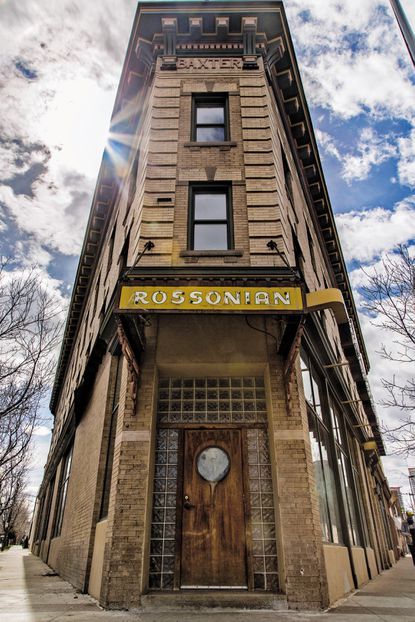
And as the author traveled, Taylor rediscovered a forgotten map of African-American aspiration, achievement, and entertainment.
There was the “black borscht belt” of vacation spots in northwestern Michigan, where the Idlewild resort spread over 3,000 acres, and featured rising stars like the Four Tops. Shearer Cottage in Oak Bluffs in Martha’s Vineyard began hosting prominent black guests in 1903.
There was even Murray’s Dude Ranch, in Victorville, California, a fully integrated vacation spot that catered to celebrities from white gossip columnist Hedda Hopper to African-American icon Lena Horne. Heavyweight champ Joe Louis trained there, and two all-black Westerns, “Harlem Rides the Range” and “The Bronze Buckaroo,” used the ranch for sets.
At first, the Green Book depended on establishments for its information, which could be unreliable. Harlem’s 101 Ranch, listed as a cabaret in the 1938 edition, was actually a sex club where jazzman "Pops" Foster remembered, you saw "women goin' with women, men goin' with men, people on the floor gettin' their thing." It was raided and shut down the following year.
But as his guide grew bigger, Green made sure it became more professional, too.
Articles detailed the tourist attractions of cities like San Francisco while advising readers they might find it easier obtaining accommodations in Oakland, across the bay. Advertisements pushed expensive African art and cruises to the Caribbean. Listings expanded to include coffee shops and colleges.
Green died in 1960. For a while, his widow and his staff continued publishing the guide. But as integration finally, slowly spread there seemed less and less need for his guide. In 1965, the year after the Civil Rights Act outlawed discrimination, the Green Book didn’t publish at all. The 1966-67 edition was its last.
In the end, it was a casualty of the future its readers had dreamed of.
Although racists could, and still do, deny service to African-Americans, by the late ’60s, blacks could legally demand equal treatment in any establishment they visited. And once they could, they did, walking into restaurants, night clubs, hotels, and resorts that had previously turned them away.
It was good news for everybody except the African-American businesses that had once catered to the community.
Although blacks now rushed to patronize white establishments, whites were not as eager to patronize black ones. Restaurants closed. Clubs shuttered. Once-famous hotels, like New Orleans’ Marsalis Mansion – run by Wynton’s grandfather – became flophouses. And a vital, vibrant part of American history was razed then forgotten.
The lie of separate but equal had been exposed. But, sadly, some of what made that subculture not just separate and inherently unequal, but unique, was gone.
“We got what we wanted,” observed African-American activist Georgia Ayers, as she watched another historic black hotel shut down in Miami. “But we lost what we had.”
***
https://www.nydailynews.com/entertainment/ny-overground-railroad-book-20200110-ungu7wqqzrh7dl3yo5q6cebeyu-story.html
26 notes
·
View notes
Photo
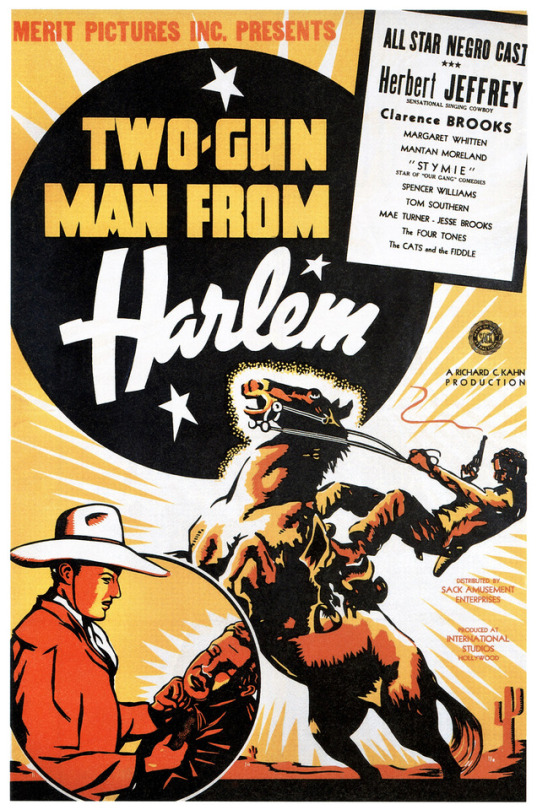
Herb Jeffries, The First Black Western Star by Raquel Stecher
“Representation matters” is a common phrase used today among film critics. While it’s considered a more modern idea, a backlash against many years of misrepresentation, one early pioneer in the 1930s saw this problem and came up with an idea to fix it. That man was Herb Jeffries.
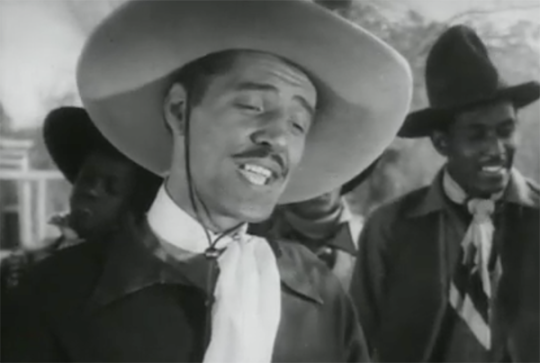
Born in Detroit in 1913, Jeffries’s heritage represented the city’s melting pot of ethnicities including African, Italian, French, Jewish, Native American and Irish. It wasn’t until he left his community that he saw the adverse effects of segregation. Too dark to pass as white, Jeffries decided to present as black and pursue a career in blues and jazz where African-American artists were thriving. Jeffries had a deep voice, incredible vocal pitch and larger-than-life presence making him a born performer. He made his way across the country performing in New York and Chicago before finally landing in Hollywood where he met small-time movie producer Jed Buell.
Jeffries and Buell collaborated on what would become the first ever all-black Western, Harlem on the Prairie (1937). The inspiration came from Jeffries’ childhood memories of watching Westerns starring Tom Mix. The genre was devoid of black characters and Jeffries knew he could make a difference. A bit of inspiration also came from Buell himself who produced The Terror of Tiny Town (1938), a Western featuring a cast entirely comprised of little people. With the singing cowboy movement (made popular by Gene Autry) in full swing it seemed fitting for Buell and Jeffries to make a Western musical.
Buell worried that Jeffries’ pale complexion would not carry over well to black audiences. In an interview with KCETV’s Huell Howser, Jeffries said “we had trouble finding African Americans who could ride, sing and act. We tested 10 or 12 and none could do all three. But I could.” Having spent much time at his grandfather’s ranch in Ohio, Jeffries had extensive experience riding horses and lassoing ropes. Harlem on the Prairie was an instant smash. The intention was to expand the scope of what African-American actors could portray on screen by means of an all-black production, catering to black audiences and screened at black theaters. This film was successful enough that it also screened in mainstream cinemas across the country.
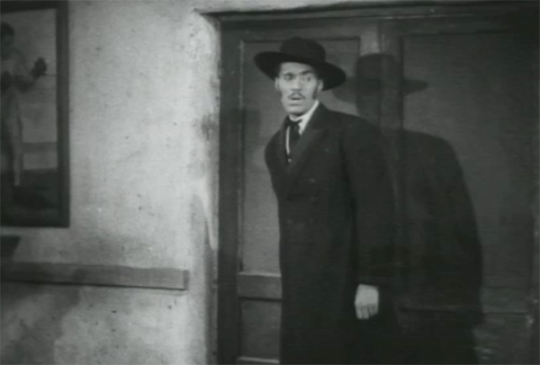
When Buell moved on to other projects, Jeffries found a new collaborator in director/producer Richard C. Kahn. They worked on three films together: TWO-GUN MAN FROM HARLEM (’38), The Bronze Buckaroo (1939) and Harlem Rides the Range (1939). These stories were adaptations of existing Westerns written by Fred Myton, retooled with different character names and added dialogue. There was no room in the budget for any additional help so it was all hands on deck. Cast members were responsible for their own stunts, Kahn worked on the screenplays and Jeffries wrote his own songs. Jeffries often joked that these were “C-pictures” because of their low-production value. Appearing with Jeffries on screen was his musical quartet The Four Tones.
Jeffries took his intended audience quite seriously. He wanted these films to be true to the Western genre while also being suitable for children. Kids weren’t interested in romance so that was toned down. In his interview with Howser, Jeffries said, “we were careful not to smoke… when we shot a guy we made sure he was the villain. Good citizens were out doing the right thing.” This foresight paid off. As he remembered, “wherever I went kids would follow me through the street, not only black kids but white kids too.”
Jeffries’ films were sometimes criticized for perpetuating black stereotypes. TWO-GUN MAN FROM HARLEM was a notable exception. The story follows Bob Blake, a ranch man falsely accused of killing a man. He’s been set up by the man’s widow, a cheating housewife caught up with a local mob syndicate. She switches Blake’s gun for the murder weapon, hence the “two-gun” reference in the title. Blake travels to Harlem, takes on the appearance of a preacher/gangster and travels back home to solve the crime under his new disguise. Along the way there are plenty of musical performances including a rendition of “I’m a Happy Cowboy”. Mantan Moreland serves as comic relief, Marguerite Whitten as a romantic interest and child actor Matthew “Stymie” Beard as a relatable figure for young audiences. What’s interesting about the quartet is that there are no white characters. Not only that, but there are no Native Americans or Mexicans either. Bob Blake is his own savior, coming to his own rescue without the help of more empowered white characters.
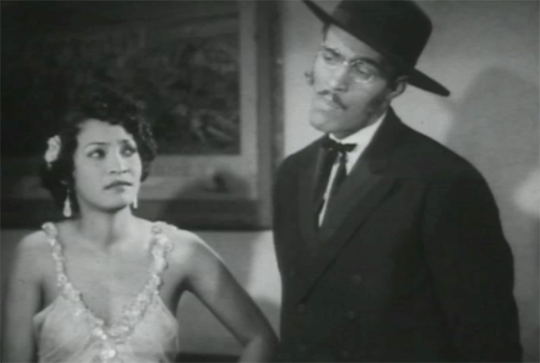
To promote TWO-GUN MAN FROM HARLEM and the other Bob Blake films, Jeffries and The Four Tones toured the South. Jeffries would ride around in his Cadillac, adorned with steer horns and his name emblazoned on the side. After screenings at black theatres, Jeffries would perform musical numbers on stage with the quartet and do cowboy tricks much to the audience’s delight. By 1939, there was a decline in black theatres and a shrinking market. Jeffries was happy to leave his career as a cowboy movie star behind when Duke Ellington invited him to join his band. He reminisced, “I was making movies, but I knew I’d rather sing with Ellington.” Until his death in 2014 at the ripe old age of 100, Jeffries could be regularly seen wearing his Stetson hat and cowboy boots and would often proclaim “I’ll always be a cowboy.”
162 notes
·
View notes
